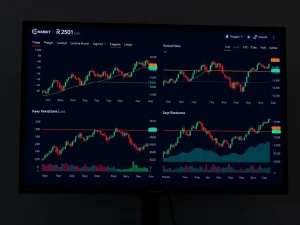Barclays Crypto Ban: Urgent Warning as UK Bank Halts Credit Card Transactions

A significant shift is underway in the UK financial landscape, directly impacting how individuals can engage with digital assets. Effective this Friday, a major institution, Barclays, will implement a decisive Barclays crypto ban, prohibiting its Barclaycard credit card users from purchasing cryptocurrencies. This move sends an urgent signal across the market, forcing many to reconsider their crypto acquisition strategies and highlighting the escalating debate surrounding UK crypto regulations. What does this mean for you, and why is one of the UK’s largest banks taking such a drastic step?
Why Did Barclays Implement This Crypto Credit Card Policy?
Barclays’ decision to block crypto credit card transactions is not arbitrary. The bank explicitly cites concerns over the inherent risks associated with digital assets, particularly their price swings. For years, Barclaycard credit cards have been a viable pathway for customers to acquire digital currencies on various exchanges. However, the bank now emphasizes the potential for severe financial repercussions for its customers. Their primary worry? That a sharp decline in cryptocurrency values could leave individuals saddled with debt they are unable to repay.
Barclays articulated its reasoning:
- Risk of Debt: A significant fall in the price of crypto assets could lead to customers incurring unmanageable debt.
- Lack of Protection: Unlike traditional financial products, crypto assets are not covered by the Financial Ombudsman Service (FOS) or the Financial Services Compensation Scheme (FSCS). This means if something goes wrong with a crypto purchase or an exchange, there’s no official recourse for investors to recover their funds.
- Market Volatility: The unpredictable nature of cryptocurrency volatility is a core concern, making it a high-risk asset class for credit-funded purchases.
While Barclays has refrained from further comment, their public statement underscores a growing apprehension within traditional financial institutions regarding the consumer risks associated with unregulated digital asset markets.
Navigating UK Crypto Regulations: What’s the Broader Picture?
The Barclays crypto ban is not an isolated incident but rather a symptom of a broader, ongoing discussion within the United Kingdom regarding the appropriate level of regulation for cryptocurrencies. The UK’s financial watchdogs are actively seeking to define the boundaries for crypto engagement, especially concerning consumer protection.
This debate intensified recently with the Financial Conduct Authority (FCA) publishing a consultation paper on May 2nd. The FCA’s paper explicitly sought public and industry views on whether further restrictions should be imposed on purchasing crypto with credit. This indicates a proactive stance by regulators to mitigate potential harm to consumers, aligning with Barclays’ preventative measures.
The regulatory landscape in the UK is complex and evolving, aiming to balance innovation with investor safety. Key aspects under consideration include:
- Defining crypto assets and their regulatory perimeter.
- Establishing clear rules for crypto service providers.
- Protecting consumers from scams and market manipulation.
- Addressing money laundering and terrorist financing risks.
Barclays’ move could set a precedent, potentially encouraging other financial institutions to adopt similar policies, further shaping the future of UK crypto regulations.
The Financial Conduct Authority (FCA) and the Debate on Credit Card Use
The Financial Conduct Authority (FCA) plays a pivotal role in shaping the future of crypto within the UK’s financial ecosystem. Their recent consultation paper is a direct response to the growing concerns about the ease with which consumers can acquire highly volatile assets using borrowed funds. The FCA’s position reflects a global trend among regulators to scrutinize the intersection of traditional finance and the nascent crypto market.
However, not all industry stakeholders agree with the notion of outright bans. The Payments Association, a prominent London-based entity, has pushed back against the idea of restricting crypto credit card purchases. Their argument centers on the principle of consumer empowerment and informed choice. They contend that equating crypto purchases with gambling, and therefore warranting a ban, overlooks the existing controls and consumer discretion that should apply within predefined credit limits.
The Payments Association highlights that:
| Argument Point | Payments Association Stance | Implication |
|---|---|---|
| Equating Crypto with Gambling | Unfair comparison; consumers should make informed choices. | Suggests overreach in regulation, stifling legitimate activity. |
| Existing Controls | Banks already have controls for high-risk asset purchases. | Further restrictions are redundant or disproportionate. |
| Cash Advance vs. Credit | Banning credit cards may force cash transactions, which some banks also block. | Limits consumer options without fully addressing risk. |
This ongoing dialogue between regulators and industry bodies is crucial for developing a balanced and effective framework for UK crypto regulations.
Understanding Cryptocurrency Volatility: Is the Ban Justified?
At the heart of Barclays’ decision and the broader regulatory debate lies the inherent cryptocurrency volatility. Unlike traditional currencies or stable assets, the value of cryptocurrencies can fluctuate wildly within short periods. This unpredictability poses significant risks, especially when purchases are made using credit, which carries interest and repayment obligations.
Consider the potential scenarios:
- Rapid Price Drops: An investor purchases crypto on a credit card, and the value plummets. They are then left with a credit card bill for an asset worth significantly less, or even nothing, creating a debt burden.
- Leverage Amplification: Using credit effectively introduces leverage, amplifying both potential gains and losses. In a volatile market, this can quickly lead to substantial debt.
- Interest and Fees: Many banks treat crypto purchases via credit cards as cash advances, which often incur higher fees and immediate interest charges, adding to the cost of acquisition even before market movements are considered.
From a bank’s perspective, mitigating these risks is paramount to protecting both their customers and their own financial stability. While proponents argue that consumers should be free to make their own choices, the banking sector often takes a more conservative approach when faced with assets lacking established regulatory frameworks and consumer protections. The Barclays crypto ban is a direct reflection of this risk aversion in the face of significant market fluctuations.
What Are Your Options After the Barclays Crypto Ban?
For individuals in the UK who previously relied on their Barclaycard credit cards for crypto purchases, this ban necessitates a shift in strategy. While a crypto credit card might no longer be an option with Barclays, other avenues remain available:
- Debit Cards: Many cryptocurrency exchanges still accept debit card payments, which use your own funds rather than borrowed credit. This eliminates the risk of debt accumulation from market downturns.
- Bank Transfers: Direct bank transfers (e.g., Faster Payments in the UK) are a common and often cost-effective method for funding crypto exchange accounts.
- Other Payment Services: Explore services like PayPal or Revolut, which may offer crypto buying options or facilitate transfers to exchanges.
- Consider Alternatives: If the risks associated with direct crypto ownership are too high, explore regulated investment products that offer exposure to digital assets, such as exchange-traded products (ETPs) where available and appropriate for your risk profile.
- Budgeting and Risk Management: Always invest only what you can afford to lose. Avoid using borrowed money for speculative investments, especially in highly volatile markets.
This change by Barclays underscores the importance of diversifying your funding methods and understanding the associated risks of each. It’s a call to greater financial prudence in the evolving crypto space, shaped by tightening UK crypto regulations.
The Evolving Landscape of Crypto Finance in the UK
The Barclays crypto ban serves as a potent reminder of the ongoing tension and evolution at the intersection of traditional finance and the burgeoning cryptocurrency market. While digital assets promise innovation and new financial paradigms, their integration into mainstream banking systems is fraught with challenges, primarily around consumer protection, regulatory clarity, and the inherent cryptocurrency volatility.
The actions of institutions like Barclays, coupled with the active consultation by the Financial Conduct Authority (FCA), signal a clear direction: the UK is moving towards a more structured and potentially more restrictive environment for crypto transactions, especially those involving credit. This shift is not necessarily an outright rejection of crypto but rather an attempt to manage its risks within established financial frameworks.
For consumers, this means a need for increased awareness and responsible financial behavior. For the crypto industry, it necessitates continued engagement with regulators to foster understanding and build trust. The debate is far from over, but the latest developments from Barclays and the FCA undeniably mark a significant chapter in the journey of crypto adoption and regulation within the United Kingdom.









